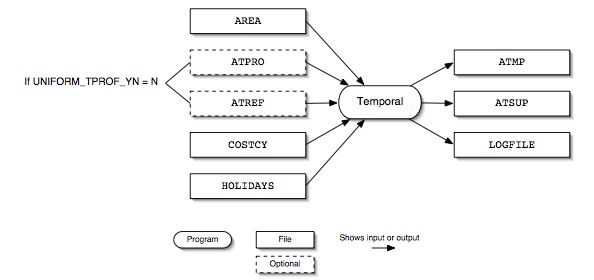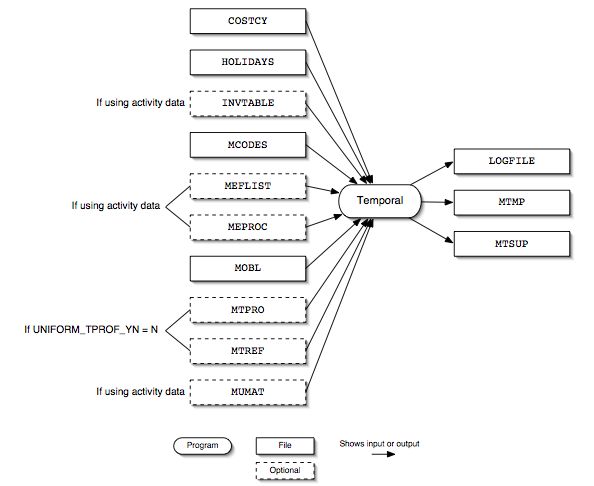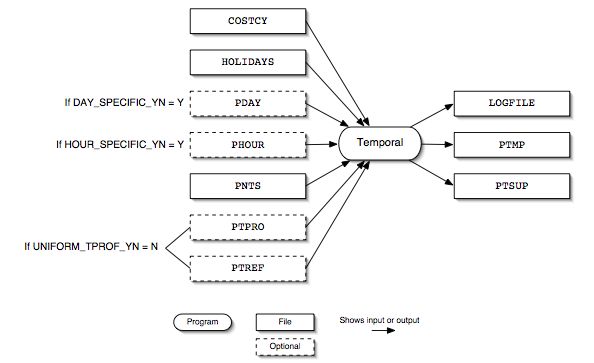Figure 6.22, “Temporal input and output files for area sources” shows the input and output files for the Temporal program for area sources. The input files include the inventory file output from Smkinven (AREA), the temporal profiles file (ATPRO), the temporal cross-reference file (ATREF), the country, state, and county codes file (COSTCY), and the holidays file (HOLIDAYS).
Temporal outputs an hourly emissions file (ATMP), a temporal allocation supplemental file (ATSUP), and a log file (LOGFILE).
Figure 6.23, “Temporal input and output files for mobile sources” shows the input and output files for the Temporal program for mobile sources. The input files include the country, state, and county codes file (COSTCY), the holidays file (HOLIDAYS), and, if activity data are used, the inventory data table (INVTABLE). Spcmat also reads the mobile codes file (MCODES). The MEFLIST file lists available emission factors files created by Emisfac, which is used when processing activity data, as is the mobile emission process file (MEPROC). Temporal also uses the inventory file output from Smkinven (MOBL), the temporal profiles file (MTPRO), the temporal cross-reference file (MTREF), and the ungridding matrix file for activity data (MUMAT).
Temporal outputs a log file (LOGFILE), an hourly emissions file (MTMP), and a temporal allocation supplemental file (MTSUP).
Figure 6.24, “Temporal input and output files for point sources” shows the input and output files for the Temporal program for point sources. The input files include the country, state, and county codes file (COSTCY) and the holidays file (HOLIDAYS). If using day-specific data, the PDAY file is read, and the PHOUR file is read when using hour-specific data. Temporal also uses the inventory file output from Smkinven (PNTS), the temporal profiles file (PTPRO), and the temporal cross-reference file (PTREF).
Temporal outputs a log file (LOGFILE), an hourly emissions file (PTMP), and a temporal allocation supplemental file (PTSUP).
| File Name | Format | Description |
|---|---|---|
| [AREA|MOBL|PNTS] | SMOKE map | Intermediate inventory file produced by Smkinven |
| [A|M|P]TPRO | ASCII | Temporal profiles |
| [A|M|P]TREF | ASCII | Temporal cross-reference file |
| COSTCY | ASCII | Country/state/county codes file, used to determine counties that do not use Daylight Saving time. |
| HOLIDAYS | ASCII | Holidays file by Gregorian date, for applying holiday temporal profiles. |
| INVTABLE (optional) | ASCII | Inventory data table listing pollutant and activity names; required only if activity data are used |
| MCODES (optional) | ASCII | Mobile codes file for converting road class numbers and vehicle type numbers to SMOKE internal standard |
| MEFLIST (optional) | ASCII | List of emission factors files produced by Emisfac |
| MEPROC (optional) | ASCII | Mobile emission processes file |
| MUMAT (optional) | ASCII | Ungridding matrix file produced by Grdmat |
| PDAY (optional) | I/O API NetCDF | Day-specific intermediate inventory file created by Smkinven (required if DAY_SPECIFIC_YN is set to Y) |
| PHOUR (optional) | I/O API NetCDF | Hour-specific intermediate inventory file created by Smkinven (required if HOUR_SPECIFIC_YN is set to Y) |
-
DAY_SPECIFIC_YN: See description in Section 6.13.3.2, “Input Environment Variables”
-
HOUR_SPECIFIC_YN: See description in Section 6.13.3.2, “Input Environment Variables”
-
OUTZONE: See description in Section 6.11.3.2, “Input Environment Variables”
-
RENORM_TPROF: [default: Y]
Defines whether Temporal normalizes the temporal profiles or uses them as they exist in the data file. If the profiles are specified as decimal values and sum to 1, then specify N. Otherwise, specify Y and the program will sum the values associated with each profile and then divide each value by the sum, thereby creating a normalized profile.
-
Y: Normalize the temporal profiles
-
N: Use the temporal profile values as they exist in the data file
-
-
REPORT_DEFAULTS: See description in Section 6.2.3.2, “Input Environment Variables”
-
SMK_AVEDAY_YN: See description in Section 6.2.3.2, “Input Environment Variables”
-
SMK_EF_MODEL: [default: MOBILE6]
Name of the emission factor model to use. NOTE: At this time only the default value can be used.
-
SMK_MAXERROR: See description in Section 6.13.3.2, “Input Environment Variables”
-
SMK_MAXWARNING: See description in Section 6.13.3.2, “Input Environment Variables”
-
SMK_SOURCE: See description in Section 6.2.3.2, “Input Environment Variables”
-
UNIFORM_TPROF_YN: [default: N]
Defines whether to use uniform temporal profiles for all sources.
-
Y: Use uniform temporal profiles
-
N: Use temporal profiles file and temporal cross-reference file
-
-
ZONE4WM: [default: Y]
Defines whether Temporal applies weekly and monthly temporal profiles using time zones. If SMOKE does not apply the profiles using the sources’ time zones, then all sources change from one day to the next or one month to the next at the same hour. This is what other emission processing systems have typically done, and it is a minor distinction in most cases.
-
Y: Use time zones
-
N: Do not use time zones
-
When running Temporal interactively, the following inputs will be requested. The default values for these are set by the G_STDATE, G_STTIME, and G_RUNLEN environment variables.
-
Start date: Starting date of simulation in Julian (DDDYYYY) or Gregorian (MMDDYYYY) formats
-
Start Time: Starting time of simulation in HHMMSS
-
Duration: Simulation duration in hours
| File Name | Format | Description |
|---|---|---|
| [A|M|P]TMP | I/O API NetCDF | Hourly emissions by source; if using elevated point sources as part of point-source processing, this file contains only the layer-1 emissions |
| [A|M|P]TSUP | ASCII | Temporal allocation supplemental file |
| LOGFILE | ASCII | Log generated from executing Temporal |


